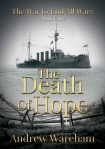The Death of Hope by Andrew Wareham (classic books for 7th graders TXT) 📗

- Author: Andrew Wareham
Book online «The Death of Hope by Andrew Wareham (classic books for 7th graders TXT) 📗». Author Andrew Wareham
“Awful waters, sir, northabout Scotland.”
The Captain nodded gravely.
“There is a possibility of commerceraiders in the eastern Atlantic – we are to watch for anything out of theordinary, Adams. Doubt we shall see much. Policy is not to make the passage ofthe Channel and the North Sea. Full of submarines. Just starting to clear them,using airships, of all things! Don’t know what the Navy’s coming to! Flappingabout in the air! What would Nelson have said to that?”
Christopher could not imagine, shook hishead in dismay. Wise lieutenants did not argue with their captain, particularlythose in his peculiar position. He suspected that Nelson would haveenthusiastically supported anything that led to the confusion of his enemies –he had espoused new tactics and the innovation of the carronade in his day,would probably have demanded to fly in an airship. Not for him to say so on hiscaptain’s bridge.
“Set additional lookouts, sir, onsubmarine watch?”
“Yes, the First will be setting doublelookouts in daylight hours. No point to doing so at night – they can’t see anythingthen.”
“How close inshore on the Irish coast,sir?”
Intelligence reports insisted that Germansubmarines had made contacts with Irish insurgents, delivering small arms andammunition to them at the smaller fishing ports.
“I do not believe these tales of a greatnetwork of traitors in Ireland, Adams. A few madmen, that is all. We can ignorethe very concept of whole villages seeing a German submarine and sayingnothing. Remain twenty to forty miles distant from the coast, as convenient forkeeping our course.”
Orders were to be obeyed and Christopherhad no reason to suppose that Intelligence were particularly clever. Some remarkablystrange officers gravitated into their ranks; he had been surprised notto have been contacted himself, being an obvious recruit, his career destroyedand himself potentially an embarrassment.
He was acting navigator, waiting on theformal confirmation of his promotion to the role, had every expectation ofreceiving the news quickly. His period as a pariah was over and he was acceptedback into the hierarchy of the genteel. His career would never recover and hewould be gently requested to send in his papers when the war ended, as part ofthe process of reducing the size of the wartime Navy; he was, however, nolonger formally disgraced. He would leave with a respectable wartime recordthat might permit him to return to Town.
Only since he had been accepted again hadhe realised just how important his place in Society had been to him. His fatherwould see to a career, he did not doubt. He wondered just how he would be ableto serve the family, and whether they would actually permit him to remain inLondon. It might be that he would be acknowledged but sent off out of publicview, banished to work in Ireland or France or some even more distant locationwhere the family had interests. St Petersburg was a possibility, where therewas at least a semblance of Society, or out to India, said to have somecivilisation under the Raj; at worst Canada, known to be boring, or Australiawhich had still to recover from its convict days.
He had a future, other than suicide. It mightstill not be entirely attractive.
Course set for the next three hours, hewas at liberty to leave the bridge, nodded to the watchkeeper and stepped downto the wheelhouse, checking who was on watch there, before going down to his cabin.An unknown leading seaman had the wheel, was showing quietly relaxed andconfident, easing the ship’s head as she crossed the Atlantic swell, notpermitting the rollers to push her off course. Satisfied, he paced off to thewardroom, seeking a quiet cup of tea and perhaps a sandwich, having breakfastedearly to be on the bridge for the passage through the Straits.
The Navigator had been taken off the shipby small boat as they passed Gibraltar, promoted to Commander in apredreadnought in harbour there. The promotion to full commander was welcome,the ship was not, and he had left Black Prince in some dismay, going from acruiser renowned as a crack ship to an ancient battleship staggering off totake part in the bombardments off the Dardanelles and to spend the bulk of her daysat anchor in Mudros as a defence against sorties by the Austro-Hungarian orTurkish navies. Christopher had felt sympathy for him, delight that he hadtaken over as Navigator, must be promoted soon. He did not think he would be superseded,replaced by another man; he had returned to the mainstream of the service.
He smiled to himself as he sat with histeacup to hand. A year previously and he had been one of the coming men,certain to be an admiral in his thirties; now he was happy that he would make lieutenantcommander with a certainty that there would be nothing more forthcoming.
‘How have the mighty fallen’, he mused, entertainedby his own philosophical acceptance of failure.
“You seem happy this morning, Adams!”
“Contemplating my blessings, Crewe. Backin the real Navy after playing about in the Med. Much to be said for a bigship, you know.”
The Gunnery Commander nodded ponderousagreement. Black Prince was an armoured cruiser and was definitely not a smallship.
“Hear we are due for a few months of dockyardtime, Adams. Admiralty has digested the loss of Good Hope at Coronel andnoticed some of the reasons why. Finally worked out that placing guns within sixfeet of the waterline don’t make sense!”
“That’s quick going, Crewe! Barely sixmonths





Comments (0)